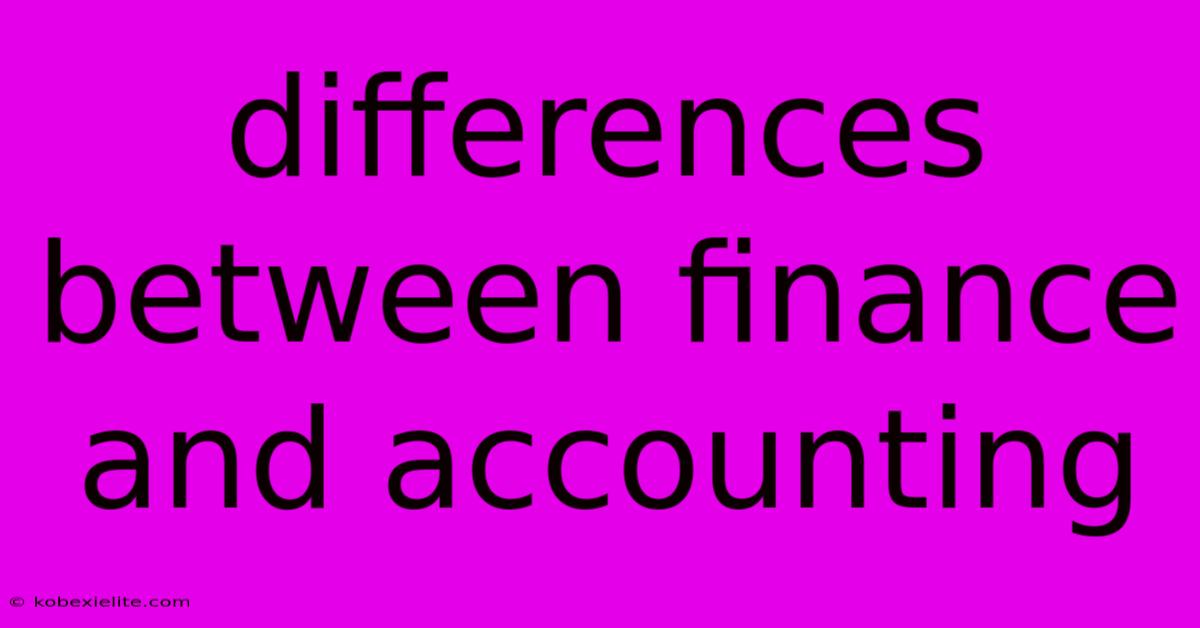Differences Between Finance And Accounting

Discover more detailed and exciting information on our website. Click the link below to start your adventure: Visit Best Website mr.cleine.com. Don't miss out!
Table of Contents
Finance vs. Accounting: What's the Difference?
Finance and accounting are often used interchangeably, but they are distinct disciplines with different focuses and goals. While closely related, understanding their key differences is crucial for anyone pursuing a career in business or seeking to improve their financial literacy. This article will delve into the core distinctions between finance and accounting, highlighting their roles, responsibilities, and career paths.
What is Accounting?
Accounting is primarily focused on recording, classifying, summarizing, and interpreting financial transactions. Think of accountants as the meticulous record-keepers of a company's financial history. They ensure accuracy and compliance with generally accepted accounting principles (GAAP) or International Financial Reporting Standards (IFRS). Key activities include:
- Bookkeeping: The foundational task of recording all financial transactions.
- Financial Statement Preparation: Creating key reports such as the balance sheet, income statement, and cash flow statement.
- Auditing: Verifying the accuracy and reliability of financial records.
- Tax Preparation: Filing tax returns and ensuring compliance with tax laws.
- Cost Accounting: Analyzing and tracking the costs associated with producing goods or services.
Types of Accounting
There are several different types of accounting roles, each with its own specialization:
- Public Accounting: Working for an external firm that audits companies and provides other financial services.
- Private Accounting: Working directly for a company to manage its internal financial affairs.
- Government Accounting: Working for a government agency to manage its finances.
- Forensic Accounting: Investigating financial fraud or other wrongdoing.
What is Finance?
Finance, on the other hand, uses financial information to make strategic business decisions. It's forward-looking, using accounting data and other information to plan for the future. Finance professionals are concerned with maximizing shareholder wealth and making investment decisions that improve the company's financial health. Key areas include:
- Financial Planning and Analysis (FP&A): Forecasting future financial performance and developing budgets.
- Corporate Finance: Managing a company's capital structure, raising capital, and making investment decisions.
- Investments: Evaluating and selecting investment opportunities, such as stocks and bonds.
- Financial Risk Management: Identifying and mitigating financial risks.
- Portfolio Management: Managing a portfolio of investments to achieve specific financial goals.
Types of Finance Roles
Finance offers a broad range of career options, including:
- Financial Analyst: Analyzing financial data and making recommendations to management.
- Investment Banker: Advising companies on mergers, acquisitions, and other financial transactions.
- Portfolio Manager: Managing a portfolio of investments for individuals or institutions.
- Financial Controller: Overseeing the financial operations of a company.
- Treasurer: Managing a company's cash flow and investments.
Key Differences Summarized
| Feature | Accounting | Finance |
|---|---|---|
| Focus | Recording and reporting past transactions | Using financial information for decision-making |
| Orientation | Historical | Future-oriented |
| Primary Goal | Accurate and reliable financial statements | Maximizing shareholder value |
| Key Activities | Bookkeeping, auditing, tax preparation | Financial planning, investment analysis, risk management |
| Methods | GAAP/IFRS | Discounted cash flow, net present value, etc. |
Conclusion
While both accounting and finance are essential for the successful operation of any business, they have distinct roles and responsibilities. Accounting provides the accurate financial data, while finance uses that data to guide strategic decision-making. Understanding this fundamental difference is key to choosing a career path and making informed financial decisions. Both fields offer exciting and rewarding opportunities for those with strong analytical and problem-solving skills.

Thank you for visiting our website wich cover about Differences Between Finance And Accounting. We hope the information provided has been useful to you. Feel free to contact us if you have any questions or need further assistance. See you next time and dont miss to bookmark.
Featured Posts
-
Strictly Come Dancing Final Night Winners
Dec 15, 2024
-
Finance Factors Manoa
Dec 15, 2024
-
Subaru Certified Pre Owned Finance Rate
Dec 15, 2024
-
Heisman Hunters Close 2024 Victory
Dec 15, 2024
-
Bali Nine Final 5 Released
Dec 15, 2024
